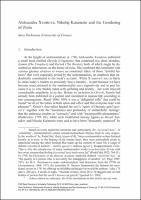Chapter Aleksandra Xvostova, Nikolaj Karamzin and the Gendering of Toska
Abstract
This article reviews the evolution of toska in eighteenth-century literary discourse to demonstrate this sentiment's profound connection with notions of femininity. That century's use of toska culminates in Aleksandra Xvostova's then popular Otryvki (Fragments, 1796), the emotional emphases of which were one of the reasons for its success. In fact, we argue that Russian women's writing contains a tradition of emotional expression that is lexically distinct from the male tradition. Xvostova’s emphatic and reiterative use of toska participates in a larger debate about gender and the 'ownership' of personal emotions and it was relevant to literary arguments about "feminization" that involved writers such as Nikolaj Karamzin and Vasilij Zukovskij, but also a number of women authors (e.g. Ekaterina Urusova, Anna Turčaninova, Elizaveta Dolgorukova, Anna Volkova), whose work asserts the right of the female subject to both suffer strong emotion and to express it.


 Download
Download Web Shop
Web Shop